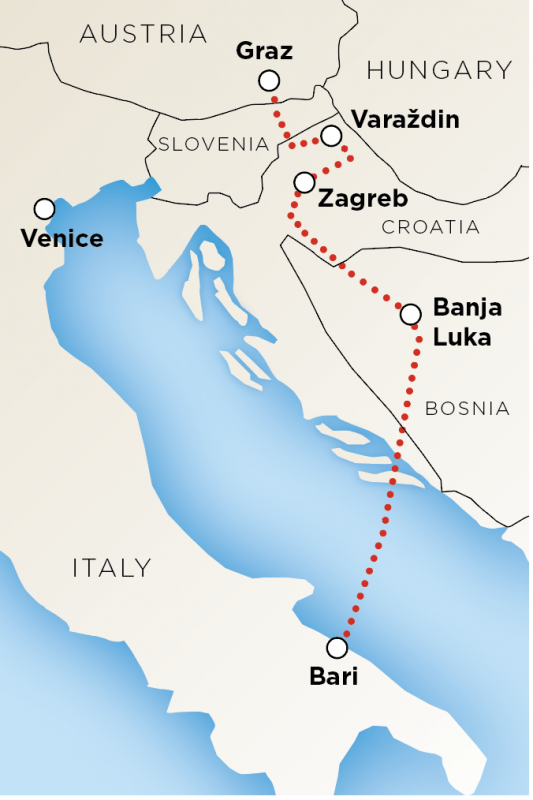A khaki felt army cap has sat on a bookshelf in my home in Sydney for nine years.
Two metal press-studs secure the brim, and the five-pointed, red communist star graces the front.
The crown has the faint odour of human sweat.
It is a partizanka, a cap worn by Yugoslav Partisan soldiers in Croatia and western Bosnia during World War II.
The partizanka is something of a collector’s piece, as few like it remain.
For me, it represents a promise I need to fulfil.
Partisan Promise

It is impossible to look at the cap and not wonder about its bloody history.
It had two rightful owners, Boris Puks*, a Croatian Partisan fighter, and Ernest ‘Ern’ Brough, a World War II veteran from Geelong, Victoria, who gave it to me in 2009.
My part in its history is a small footnote compared to the life it once led in the mountains and forests of wartime Yugoslavia.
The cap arrived in the post not long after I met Ern, accompanied by a note: “Marc – a gift to me from Puks Boris, 1944, at Cassma, Croatia.”
When I phoned Ern to thank him, he made me promise to give it to the Australian War Memorial when he died.
This artefact now belongs where Ern had intended.
The voices of World War II are fast disappearing and as Ern is still alive, I want him to have the chance to once again share his story.
* Boris Puks is called Puks Boris in Ernest Brough’s book, Dangerous Days.
A Great Adventure

Six weeks after Ern turned 20, on March 28, 1940, he enlisted in the Second Australian Imperial Force.
This apprentice butcher from Drouin, in rural Victoria, had very little life experience behind him, but the Army deployed him to Libya to protect the besieged port of Tobruk.
He arrived in May 1941.
“It was a case of keeping ’em out. Don’t let ’em in, that’s it. Fight for your life,” he said later.
Following nearly three months of relentless battle, Ern was wounded by German machine-gun fire during a patrol.
He recovered and was then sent to Egypt to fight in the pivotal Battle of El Alamein. Captured by German forces, Ern spent time in a POW camp in Italy before eventually ending up in Stalag XVIII-A/Z, a notorious Nazi POW camp in Austria.
After two years, along with fellow Australian Sergeant Arnold ‘Allan’ Berry, and New Zealander Private Eric Baty, he escaped from an Arbeitskommando (prison farm camp) near Graz and spent two months on a desperate flight through first Austria, and then Slovenia, Croatia and Bosnia.
Introducing Ern

Ern shared these wartime experiences in 2009 in his memoir Dangerous Days: A Digger’s Great Escape, which he co-wrote with author Kim Kelly.
I first met Ern at the Sydney office of HarperCollins, where I interviewed him about the book.
He was a big, robust man of 89, with sparkling eyes and a hearty laugh.
Our conversation flowed easily as I knew the territory where the Partisans had fought.
In the 1990s, I’d worked in the former Yugoslavia for the United Nations as a press and information officer and had travelled throughout Croatia and Bosnia, and knew the areas the three escapees had journeyed through, a route that included the Croatian towns of Varaždin, Ivanec and Kalnik, the capital Zagreb, and Banja Luka in the Serb region of Bosnia.
I had also experienced war in that part of the world.
I’d been shot at and trapped under artillery and mortar fire, seen people die from gunshot wounds and burns, and felt many times the uncontrollable fear that can grip you in a war zone.
None of that compares to Ern’s war experiences, whose courage earned him the Military Medal.
But I could understand why returned soldiers suffer from post-traumatic stress disorder (PTSD).
War occupied only a few years of Ern’s young life but his scars have never truly faded – it was hard not to notice his shaking left hand, the nerves damaged by shell shock.
Yet he often insists he was not afraid in battle.
“I wasn’t very frightened of anything,” he tells me.
“I think it’s because I had a flash of blood from my mother that I did not fear for anything.”
Ern reckons he inherited the fighting resilience of his mother’s cousin, Captain Albert Jacka, a World War I Gallipoli veteran who earned a Victoria Cross.















